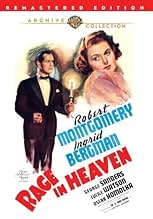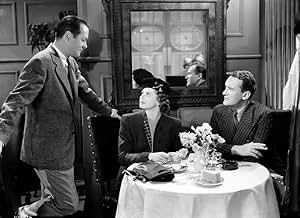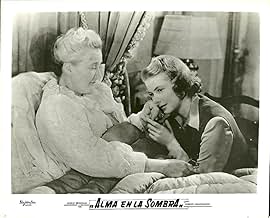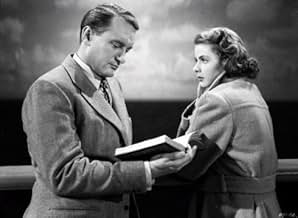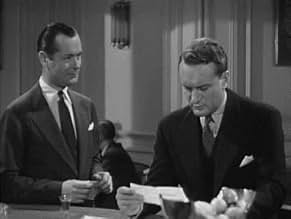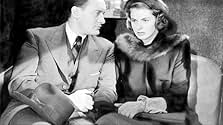AVALIAÇÃO DA IMDb
6,4/10
1,4 mil
SUA AVALIAÇÃO
Adicionar um enredo no seu idiomaRobert Montgomery and George Sanders team up to play against type in this probing psychological thriller that features Ingrid Bergman as the object of their obsessions.Robert Montgomery and George Sanders team up to play against type in this probing psychological thriller that features Ingrid Bergman as the object of their obsessions.Robert Montgomery and George Sanders team up to play against type in this probing psychological thriller that features Ingrid Bergman as the object of their obsessions.
- Direção
- Roteiristas
- Artistas
- Prêmios
- 3 vitórias no total
Frederick Worlock
- Solicitor-General
- (as Frederic Worlock)
Ludwig Hardt
- Durand
- (as Ludwig Hart)
Stuart Hall
- Traveling Salesman
- (cenas deletadas)
Major McBride
- Bank Clerk
- (cenas deletadas)
Clive Morgan
- Traveling Salesman
- (cenas deletadas)
Joseph North
- Undertaker
- (cenas deletadas)
Wyndham Standing
- Dr. McTernan
- (cenas deletadas)
Harry Allen
- Jury Foreman
- (não creditado)
Avaliações em destaque
James Hilton was not a great novelist, but he was a popular one in the 1930s and 1940s, and two of his books have managed to become minor classics. Both also were the basis of popular films: LOST HORIZON and GOODBYE MR. CHIPS. But, oddly enough, they were not the only Hilton novels that made it to the screen, nor the only two that became classic films. RANDOM HARVEST can be added to his novels that became film classics. And he also wrote his "Crippen" novel, WE ARE NOT ALONE (which starred Paul Muni and Dame Flora Robson), and this film, RAGE IN HEAVEN. In story it actually resembles RANDOM HARVEST a bit: In that film Ronald Colman is an amnesiac from World War I who escapes from an asylum, and eventually turns out to be the head of a large industrial empire. In RAGE IN HEAVEN Robert Montgomery is a paranoid who flees an asylum in France, and turns out to be the head of a large industrial empire. But Colman's character is intelligent and fair minded - a good boss. Montgomery is argumentative, harsh, and (ultimately) incompetent and cowardly. One can say that RAGE IN HEAVEN is the dark side of RANDOM HARVEST.
Robert Montgomery's film career is one of the most aggravating in Hollywood history. He built up a career in the 1930s playing cads and bounders in MGM comedies, with an occasionally good comic hero role (THE LAST OF MRS. CHEYNEY and TROUBLE FOR TWO come to mind). Then he got the plum role of the psychopathic Danny in NIGHT MUST FALL, and an Oscar nomination for best actor in 1937. But he did not get the Oscar (Spencer Tracy did). I have always suspected that had Montgomery won the Oscar he deserved to his name would be properly remembered today, as more than just a good actor who was the father of television's "Samantha", Elizabeth Montgomery. Instead, while he still had some good parts later in his career (many as a director and producer, as well as actor), he never got the recognition he thoroughly deserved.
It is obvious that RAGE IN HEAVEN was meant to be a follow-up "psycho" role for Montgomery, following Danny. But Phillip Morell is not as well done as Danny, probably because NIGHT MUST FALL was a play by Emlyn Williams originally, and so it was easier to transfer it to the screen than Hilton's novel. But then, LOST HORIZON, MR. CHIPS, and RANDOM HARVEST were well done screenplays too. Danny (for all his murderous habits) has his human moments, but Phillip doesn't. Phillip is always under-spoken and wide eyed. He always is on the verge of exploding (and similarly of collapsing - witness the moment the Union leadership force their way into his office to confront him over his unwillingness to settle the labor impasse, and how he just collapses and runs out yelling, "Give them whatever they want!"). A modern treatment might develop his mania somewhat. It is obvious that Hilton understood what paranoids were capable of - the business about the hidden confession in the diary rings true - but it is still not developed enough for the audience to understand. We know that Phillip's father was insane (and committed suicide) but more details are needed.
It was Ingrid Bergman's third or fourth American film. She was slowly inching her way to real stardom (she had touched it opposite Leslie Howard in the Hollywood version of INTERMEZZO), but her performance, while natural, is not very memorable. George Sanders again demonstrates his dependability in any role, here as a good guy almost destroyed by his mad friend. Oscar Homolka does a good job as the asylum head, whose assistance to Bergman saves Sanders in the end. It is not as good a film as it should have been with a better laid out script, but it is watchable one or two times.
Robert Montgomery's film career is one of the most aggravating in Hollywood history. He built up a career in the 1930s playing cads and bounders in MGM comedies, with an occasionally good comic hero role (THE LAST OF MRS. CHEYNEY and TROUBLE FOR TWO come to mind). Then he got the plum role of the psychopathic Danny in NIGHT MUST FALL, and an Oscar nomination for best actor in 1937. But he did not get the Oscar (Spencer Tracy did). I have always suspected that had Montgomery won the Oscar he deserved to his name would be properly remembered today, as more than just a good actor who was the father of television's "Samantha", Elizabeth Montgomery. Instead, while he still had some good parts later in his career (many as a director and producer, as well as actor), he never got the recognition he thoroughly deserved.
It is obvious that RAGE IN HEAVEN was meant to be a follow-up "psycho" role for Montgomery, following Danny. But Phillip Morell is not as well done as Danny, probably because NIGHT MUST FALL was a play by Emlyn Williams originally, and so it was easier to transfer it to the screen than Hilton's novel. But then, LOST HORIZON, MR. CHIPS, and RANDOM HARVEST were well done screenplays too. Danny (for all his murderous habits) has his human moments, but Phillip doesn't. Phillip is always under-spoken and wide eyed. He always is on the verge of exploding (and similarly of collapsing - witness the moment the Union leadership force their way into his office to confront him over his unwillingness to settle the labor impasse, and how he just collapses and runs out yelling, "Give them whatever they want!"). A modern treatment might develop his mania somewhat. It is obvious that Hilton understood what paranoids were capable of - the business about the hidden confession in the diary rings true - but it is still not developed enough for the audience to understand. We know that Phillip's father was insane (and committed suicide) but more details are needed.
It was Ingrid Bergman's third or fourth American film. She was slowly inching her way to real stardom (she had touched it opposite Leslie Howard in the Hollywood version of INTERMEZZO), but her performance, while natural, is not very memorable. George Sanders again demonstrates his dependability in any role, here as a good guy almost destroyed by his mad friend. Oscar Homolka does a good job as the asylum head, whose assistance to Bergman saves Sanders in the end. It is not as good a film as it should have been with a better laid out script, but it is watchable one or two times.
One of James Hilton's lesser novels got a lesser production from MGM with his Day Of Reckoning becoming Rage In Heaven. This has to be one of the few instances where a psychiatrist saves the day.
I think it ironic that Robert Montgomery got cast in the lead here against his usual type. It must have been an easier sell to Louis B. Mayer to cast him after having proved his acting chops in Night Must Fall. Playing another charming maniac got Montgomery an Academy Award nomination in that film. So Mayer having been convinced was less reluctant to have him cast here.
When we first meet Montgomery we find him inside an insane asylum in France and while his doctor, Oscar Homolka is discussing his case, Montgomery up and escapes from the place. Making it back to Great Britain he goes back to his mother's place and Lucille Watson as the mother welcomes him, not knowing of his hiatus in the booby hatch.
She's got a nice new secretary/companion in Ingrid Bergman and Montgomery likes her lot. She likes George Sanders his good friend and incidentally it was Sander's character name under which Montgomery was in the asylum under.
Montgomery woos and wins Ingrid, he's now running Watson's factory and that makes him a big man and no doubt helps his cause with Ingrid. Sanders is now working for him. But this Othello has his own Iago inside him provoking the green eyed monster without any outside provocation.
When Bergman turns to Sanders after one of Montgomery's inexplicable rages, Montgomery conceives a diabolical plot to frame Sanders for his own murder. That's the best part of the film, there's no way Sanders could have or should have gotten out of it. Especially without Montgomery to be questioned.
I liked the fact that both Montgomery and Sanders were playing against type. Sanders is a good guy, one of the few films he's not working any angles. Ingrid was steadfast and loyal, her part's not that much of a stretch for her talents.
I won't give away the ending, but let me say it was way too contrived and coincidental. Rage In Heaven does not belong in the top tier of films for any of the three leads.
I think it ironic that Robert Montgomery got cast in the lead here against his usual type. It must have been an easier sell to Louis B. Mayer to cast him after having proved his acting chops in Night Must Fall. Playing another charming maniac got Montgomery an Academy Award nomination in that film. So Mayer having been convinced was less reluctant to have him cast here.
When we first meet Montgomery we find him inside an insane asylum in France and while his doctor, Oscar Homolka is discussing his case, Montgomery up and escapes from the place. Making it back to Great Britain he goes back to his mother's place and Lucille Watson as the mother welcomes him, not knowing of his hiatus in the booby hatch.
She's got a nice new secretary/companion in Ingrid Bergman and Montgomery likes her lot. She likes George Sanders his good friend and incidentally it was Sander's character name under which Montgomery was in the asylum under.
Montgomery woos and wins Ingrid, he's now running Watson's factory and that makes him a big man and no doubt helps his cause with Ingrid. Sanders is now working for him. But this Othello has his own Iago inside him provoking the green eyed monster without any outside provocation.
When Bergman turns to Sanders after one of Montgomery's inexplicable rages, Montgomery conceives a diabolical plot to frame Sanders for his own murder. That's the best part of the film, there's no way Sanders could have or should have gotten out of it. Especially without Montgomery to be questioned.
I liked the fact that both Montgomery and Sanders were playing against type. Sanders is a good guy, one of the few films he's not working any angles. Ingrid was steadfast and loyal, her part's not that much of a stretch for her talents.
I won't give away the ending, but let me say it was way too contrived and coincidental. Rage In Heaven does not belong in the top tier of films for any of the three leads.
I guess I'll be the resident moron of this film's comment section. I liked Rage in Heaven. It was entertaining, interesting, and involving.
I realize Robert Montgomery phoned in his role. His complete detachment makes the character evil rather than sick, and one cannot feel sympathy for him, if we were ever supposed to. The biggest problem is that his flat line readings and cool demeanor make it unbelievable that Bergman married a man so completely lacking in self-esteem, charm, and ardor.
The very young, pre-superstar Ingrid Bergman is marvelous - very fresh and vibrant in the beginning, her personality becoming more somber after a short time being married to Montgomery. And who can blame her. George Sanders is excellent, his portrayal possessing all the charm and passion Montgomery lacks.
As far as this plot being contrived, perhaps, but it was also clever. The original ending of "Fatal Attraction" was based on the same idea. Seen in today's modern perspective "Rage in Heaven" is most interesting. The obsession that Phillip had for Wade - very bizarre indeed!
I realize Robert Montgomery phoned in his role. His complete detachment makes the character evil rather than sick, and one cannot feel sympathy for him, if we were ever supposed to. The biggest problem is that his flat line readings and cool demeanor make it unbelievable that Bergman married a man so completely lacking in self-esteem, charm, and ardor.
The very young, pre-superstar Ingrid Bergman is marvelous - very fresh and vibrant in the beginning, her personality becoming more somber after a short time being married to Montgomery. And who can blame her. George Sanders is excellent, his portrayal possessing all the charm and passion Montgomery lacks.
As far as this plot being contrived, perhaps, but it was also clever. The original ending of "Fatal Attraction" was based on the same idea. Seen in today's modern perspective "Rage in Heaven" is most interesting. The obsession that Phillip had for Wade - very bizarre indeed!
A somber-hued melodrama whose psychology is more compelling than its dramaturgy, Rage in Heaven sounds many of the minor-key motifs and dark timbres that would shortly coalesce into the noir cycle. Its most striking aspect has to be its acceptance of its disturbed central character as a given, without attempting to supply a neat, reassuring `explanation.'
The story set in England, for no good reason opens with a teasing prelude at a French insane asylum. But soon, in London, we meet up with Robert Montgomery as he meets up with old chum George Sanders and whisks him off to the country house of Montgomery's widowed mother (Lucile Watson), who in ailing health has retained the services of a companion (Ingrid Bergman). Though Bergman and Sanders generate some electricity, when he departs she marries Montgomery. This proves ill-advised.
Montgomery, who reluctantly has taken charge of the family's steel works, shows himself to be not only incompetent, irrationally jealous and vindictive, but also self-loathing, desperately insecure, and (as it turns out, like his father) suicidal. He requires unquestioned obedience, even at the risk of running his business into the ground or poisoning his marriage. He lures back Sanders in order to validate his suspicions of an affair between his wife and his best friend but, when no evidence emerges, devises a fiendish plot to ruin all their lives. His plans almost succeed, but for an eleventh-hour deus ex machina, in the person of the head of that sanitarium in the outskirts of Paris.
Though somewhat cleverly contrived, the ending remains a contrivance yet doesn't quite invalidate the movie's dark vision (perhaps owing more to Christopher Isherwood, who wrote the screenplay, than to James Hilton's novel). Montgomery elects to play a charming villain, as he did in Night Must Fall, perhaps unsure of just how to depict a deranged psyche (he wasn't far off the mark). Sanders gets wasted as a square-rigger, which was never his long suit.
That leaves the radiant Bergman, two years before Casablanca assured her stardom, handed the thankless world of the loyal, longanimous wifey. In this flawed but unsettling and precocious melodrama, it's she who utters the final benediction. That benediction lingers in the mind as an enlightened touch and a far cry from the black/white mentality of today's thrillers, which view psychological aberration as just a more heinous kind of evil, and so a further justification for triumphantly exterminating the evildoers.
The story set in England, for no good reason opens with a teasing prelude at a French insane asylum. But soon, in London, we meet up with Robert Montgomery as he meets up with old chum George Sanders and whisks him off to the country house of Montgomery's widowed mother (Lucile Watson), who in ailing health has retained the services of a companion (Ingrid Bergman). Though Bergman and Sanders generate some electricity, when he departs she marries Montgomery. This proves ill-advised.
Montgomery, who reluctantly has taken charge of the family's steel works, shows himself to be not only incompetent, irrationally jealous and vindictive, but also self-loathing, desperately insecure, and (as it turns out, like his father) suicidal. He requires unquestioned obedience, even at the risk of running his business into the ground or poisoning his marriage. He lures back Sanders in order to validate his suspicions of an affair between his wife and his best friend but, when no evidence emerges, devises a fiendish plot to ruin all their lives. His plans almost succeed, but for an eleventh-hour deus ex machina, in the person of the head of that sanitarium in the outskirts of Paris.
Though somewhat cleverly contrived, the ending remains a contrivance yet doesn't quite invalidate the movie's dark vision (perhaps owing more to Christopher Isherwood, who wrote the screenplay, than to James Hilton's novel). Montgomery elects to play a charming villain, as he did in Night Must Fall, perhaps unsure of just how to depict a deranged psyche (he wasn't far off the mark). Sanders gets wasted as a square-rigger, which was never his long suit.
That leaves the radiant Bergman, two years before Casablanca assured her stardom, handed the thankless world of the loyal, longanimous wifey. In this flawed but unsettling and precocious melodrama, it's she who utters the final benediction. That benediction lingers in the mind as an enlightened touch and a far cry from the black/white mentality of today's thrillers, which view psychological aberration as just a more heinous kind of evil, and so a further justification for triumphantly exterminating the evildoers.
"Rage in Heaven" belongs to the spate of Freudian movies of the forties: Hitchcock's "spellbound" Lang's "secret beyond the door" Tourneur's "cat people" Stahl's "leave her to heaven" Siodmak's "dark mirror" ,the list is endless.
"Rage in heaven" is an excellent underrated thriller.Although Philip's mother part is underwritten ,she predates the Hitchcockian mums ,those of "Notorious" "Strangers on a train" "Marnie" etc.Robert Montgomery whose character is the most interesting portrays a rich kid,probably victim of his over possessive mother -"he's more attractive than Ward" - A selfish paranoiac man who will not be satisfied till he destroys everything.His behavior makes sense:the cat,then the best friend (the enemy ,for his wife is in love with him),the wife and finally himself ,the doctor explains.
The screenplay might not be thoroughly original,but "Leave her to heaven" (1946) borrows Gene Tierney's diabolical suicide from it,and the final search has something of Cornell Woolrich (aka William Irish) ,notably his "phantom lady".
Three excellent actors,and a gripping story: you will not waste your time.
"Rage in heaven" is an excellent underrated thriller.Although Philip's mother part is underwritten ,she predates the Hitchcockian mums ,those of "Notorious" "Strangers on a train" "Marnie" etc.Robert Montgomery whose character is the most interesting portrays a rich kid,probably victim of his over possessive mother -"he's more attractive than Ward" - A selfish paranoiac man who will not be satisfied till he destroys everything.His behavior makes sense:the cat,then the best friend (the enemy ,for his wife is in love with him),the wife and finally himself ,the doctor explains.
The screenplay might not be thoroughly original,but "Leave her to heaven" (1946) borrows Gene Tierney's diabolical suicide from it,and the final search has something of Cornell Woolrich (aka William Irish) ,notably his "phantom lady".
Three excellent actors,and a gripping story: you will not waste your time.
Você sabia?
- CuriosidadesW.S. Van Dyke took over the direction of the movie from Robert B. Sinclair, who became ill shortly after shooting began. Van Dyke was in the Marines, but was granted a 14-day leave to finish the picture. Neither Sinclair nor Van Dyke was available for re-takes, which were then directed by Richard Thorpe.
- Erros de gravaçãoThe movie commences with a quote, "Heaven hath no rage like love to hatred turned", which it attributes to Milton. The quote is in fact from William Congreve's play "The Mourning Bride".
- Citações
Stella Bergen: My life is like this clearing. Nice and peaceful with paths leading in all directions. Only, I don't know which one to take.
Principais escolhas
Faça login para avaliar e ver a lista de recomendações personalizadas
- How long is Rage in Heaven?Fornecido pela Alexa
Detalhes
- Data de lançamento
- País de origem
- Idiomas
- Também conhecido como
- Rage in Heaven
- Locações de filme
- Empresa de produção
- Consulte mais créditos da empresa na IMDbPro
- Tempo de duração1 hora 25 minutos
- Cor
- Proporção
- 1.37 : 1
Contribua para esta página
Sugerir uma alteração ou adicionar conteúdo ausente

Principal brecha
By what name was Fúria no Céu (1941) officially released in Canada in English?
Responda

